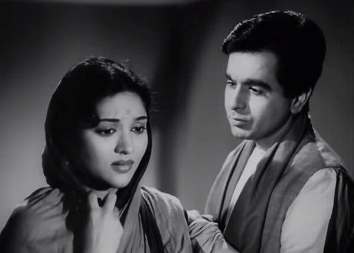 19th July, 2021
19th July, 2021On the 7th of July, the acting institution passed away, leaving behind a body of work that has influenced generations of actors in India and beyond. The great Dilip Kumar left the world at the ripe old age of 98, after living a full bodied life. Much has been written about his approach to acting and how he brought method into it by becoming the character that he played in that particular movie. So, I thought of talking about what the great man brought to the songs in his movies.
Indian movies are an interesting territory wherein the actor enacts the song on the screen. Songs are sung by a professional, technically known as the playback singer and the actor merely utters or ghost utters the lyrics of the movie to convey that he or she is singing the songs. It’s a tricky one for any actor, especially when the actor isn’t a singer. Also, there is the task of expressing the emotions of the lyrics, while staying true to the character in the movie. Not an easy one. Dilip Kumar made this difficult business look like a walk in the park. Perhaps it’s the methodical approach again. But, he always convinced you that the song is being sung by that particular character and not by a playback singer. Let me take a few examples to elucidate this.
Mitwa Lagi Yeh Kaisi – Talat Mahmood / SD Burman/ Sahir Ludhianvi (Devdas, 1955)
This is where the sobriquet ‘tragedy king’ really comes alive. The lovelorn Devdas is back in his village where he used to spend time with the love of his life (Paro), who is now married. He is wandering in all those places where they used to spend time together, with a sadness that has the look of search as well as complete despondency. Dilip Kumar’s look throughout the song, which is brilliantly done in all the departments, including the direction and camerawork, convey one sentiment – an intense craving, knowing that it will never be fulfilled!
Dil Tadap Tadap Ke – Mukesh, Lata Mangeshkar / Salil Chowdhury / Shailendra (Madhumati, 1958)
The artistic aura of Bimal Roy must’ve had something to do with this one. In this masterpiece by Salil Chowdhury, the great actor breaks the boundaries of how a love duet should be enacted. He looks dapper in his jacket and he barely looks at his love interest throughout the song, still making her feel special and wanted. In fact in one of the sequences, he is walking in the other direction while the song’s lyrics is about beckoning the lover. In the modern marketing jargon, this is what they call as a ‘paradigm shift’.
Nain Lad Jaihenin – Mohd Rafi / Naushad / Shakeel (Gunga Jamuna, 1961)
Here, the posh, city bred actor plays a rustic man from a North Indian village and he does it with extreme panache. But it’s this song where he gets into a group dance with the other men and women of the village and becomes a quintessential villager. In fact, the man wasn’t a good dancer and the story goes that he was uncomfortable figuring out the steps. But his expression throughout, which says he is totally in the song and in that village, belies that. He becomes Gunga from Haripur.
Tere Husn Ki Kya Tarif Karun – Mohd Rafi, Lata Mangeshkar / Naushad / Shakeel (Leader, 1964)
Now this one is a playful romantic number picturised on a couple who are just embarking on the journey of romantic love and they are musically and lyrically, tickling each other. Standard Hindi movie construct. Here, the great man takes the avatar of the eternal charmer. Someone, a woman can never ever refuse and this charmer knows that. It’s a very confident game that he is playing, knowing that he will win. That’s the look on Dilip Kumar’s face throughout the song. What adds to the charm is the fact the woman also knows, this is it.
Maangi Thi Ek Dua – Mahinder Kapoor / RD Burman / Anand Bakshi (Shakti, 1982)
Here, our actor is playing the role of a man who just had a son. The couple had been waiting for this moment and are overjoyed. For the outside world, he is a tough cop catching hardened criminals, but here he is melting with love. He is looking at his wife with a sense of gratitude; he is looking at his son with a sense of responsibility and plans of the coming future. He is the quintessential ‘family man’ and a very believable one at that.
These are just a few of the gems that convey Dilip Kumar’s ability to be convincing in his songs and there are many more, which all his fans would remember. Of course, the director, the song, its cinematography, played a big role but Dilip Sahab, always captured the mood and the moment of the song perfectly.
By Meraj Hasan
Meraj Hasan is a Mumbai based communication professional (and an amateur poet/musician) with a passion for listening to music the vinyl way. His 32-year-old Technics turntable along with a humble collection of LPs across genres like Classic rock, Classical, Blues and Jazz (amongst others) are his prized possessions. He's also the author of the book 'Khyaalon ki Tapri', a collection of poems. This bestseller book is available on Amazon.
He can be reached at +91 9833410791 or email: meraj.hasan@gmail.com
